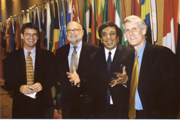
Seen at a reception that
was part of the aviation education conference are, left to right, Mick
Carney, management professor, who has done much curriculum development
for the IAMBA programs; Dale Doreen, director of the program; outgoing
dean Mohsen Anvari, and Jerry Tomberlin, interim dean.
Photo by Christian Fleury
|
by Sylvain Comeau
If you’ve flown recently, or if you have shares in a major airline,
you may feel that the airline business is in turmoil. Several experts
freely agree, and they discussed how education could address these problems
in a panel discussion that launched the first Aviation Management Education
Research Conference, held here July 16-17.
Passenger traffic has grown exponentially, from nine million passengers
in 1946 to 1.6 billion a year today.
Andy Vasarins, of NAV Canada and the Civil Air Navigation Services Organization
(CANSO), said that the industry is a victim of its own incredible success.
“Delays are increasing as capacity improvements fail to meet demand,”
Vasarins admitted, referring to one of the top complaints of harried travellers
and a major cause of air rage.
Renato Claudio Costa Pereira, another ICAO executive, spoke of reviving
the excitement and glamour of air travel.
“Air travel used to be an adventure but now, it’s a headache.
We have made air travel safe, but we need to revive the dream of many
years ago. The next step is air travel that meets the physiological and
psychological needs of the passengers.”
Jonathan Howe, director-general of Airports Council International, suggested
that the industry break out of a “navel-gazing insularity” that
has hampered innovative thinking.
“This is a very introspective industry, one that talks to itself
and recruits and promotes from within. As a result, we don’t always
think and look outside of the box. Our focus has been on technical skills;
usually the person in charge of a given area has come up through the ranks.
But management is the key word in aviation management.” Aviation
MBA programs must reflect that emphasis, Howe said.
“An AMBA program must be first and foremost an MBA; it should not
be conceptually different than a regular MBA. We’re training managers.”
Mohsen Anvari, outgoing dean of the John Molson School of Business, made
that point in discussing Concordia’s AMBA programs.
“There is an industry-wide need for management education versus technical
education,” he said. “MBA programs have been around for 30 years.
It’s a mature market, and like any mature market, the players want
to differentiate themselves. One way is to launch aviation MBA programs.
In the process, one must not substitute an industry-specific training
program for a degree-granting program.”
Anvari also made the point that while this kind of industry-specific education
is needed, it’s hard to find the right teachers. Either on-site management
professors must be persuaded to study the specific concerns of the aviation
industry, or the rare experts who do exist around the world must be induced
to share their expertise, often at considerable cost.
Another roadblock: While AMBA programs are a hit, the industry is still
reluctant to let employees take time off for study, Vasarins acknowledged.
“Management resources are scarce. Not many companies feel free to
let someone go for two years.”
Pierre Jeanniot, director-general and CEO of IATA, the Montreal-based
International Air Transport Association, suggested that competition for
key employees between airlines aggravates those fears.
“The dilemma we face is that after we send them off to get training,
how do we guarantee that they will come back to work for us?”
Concordia launched one of the first aviation management education programs
in the world in 1992. It has gone on-line (the Global AMBA), and has become
a model for programs launched as far away as Austria.
The Aviation Management Education Research Conference was hosted by Concordia’s
John Molson School of Business, which houses the AMBA and GAMBA programs.
|
|
|



